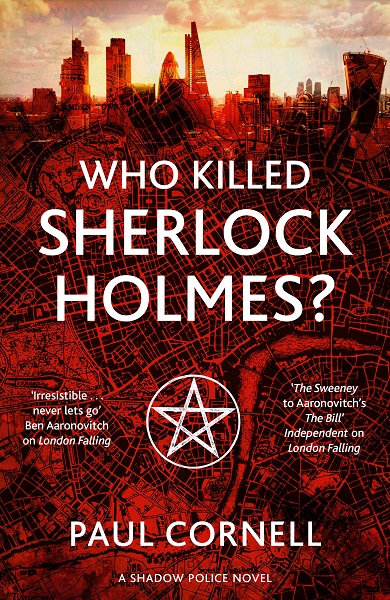Book Review: Who Killed Sherlock Holmes?
Who Killed Sherlock Holmes?
By Paul Cornell
 Who Killed Sherlock Holmes? is not a Sherlock Holmes book that you’ve read before.
Who Killed Sherlock Holmes? is not a Sherlock Holmes book that you’ve read before.
In most cases, the continuum of print pastiche (from the very traditional to the very iconoclastic) is highly derivative of previous works. That’s fine, and sometimes it’s very good. Many times, you want to pick up a book and know that it’s going to be the sort of Holmes story you expect, complete with pipe, Persian slipper, and contained mystery.
Once in a long while, however, a book like Paul Cornell’s comes along, a Sherlock Holmes-themed story so original that it feels like a blast of fresh air across a stale room. Who Killed Sherlock Holmes? kept me turning pages like mad, digesting beautiful prose like a a starving literary gourmand, and watching a film in my head that made me experience the city of London like never before.
I should note, before I get into specifics, that this book is the third in Cornell’s Shadow Police Series. I have not read the first two (non-Holmes-themed) books, but based on my experience of the third, I’m sure they’re highly enjoyable. At the same time, if you’re a Holmes aficionado who wants to jump into Book 3 first, as I did, you will not find yourself lost for long. Cornell provides ample clues to catch any reader up to previous events. If you’ve already read the other two, I have little doubt that you’ll be thrilled with this continuation.
If you’re familiar with Cornell’s other work, such as his Tenth Doctor Era-defining Doctor Who two-parter “Human Nature” and “The Family of Blood,” you already know that he is a master of blending more than one genre into a seamless whole. In Who Killed Sherlock Holmes? he provides a mystery, a police procedural, and an inventive fantasy, all without losing the intense character emphasis that stamps his writing across media. What it means to be human and to experience humanity fully are prevalent themes in the book, explored and defined by the presence of ghosts like Sherlock Holmes, London’s collective memories imbued with life and walking her streets. His diverse characters deal with mental illness, loss, fear, love, redemption, and crises of faith, and the presence of supernatural forces makes these human struggles no less real or poignant.
London herself is a central character in the novel, and the overall fantasy context of the Shadow Police Series is a mythology that feels so integrated into the city’s history and personality that it’s as if London lives and breathes in its pages. Recent literary history has produced distinctly English mythologies like Tolkien’s Lord of the Rings and Susanna Clarke’s Jonathan Strange & Mr. Norrell, and the mythology of Cornell’s series is equally immersively British, while feeling grittier and more modern—a mythology that reflects the culture of today, while hearkening back, in origin, to ancient ideas of the supernatural.

As serious and weighty as all of this sounds, I’d be remiss if I didn’t mention how funny the book is. Tongue-in-cheek turns of phrase and ironic situations mingle with life-and-death peril in a way that keeps the story constantly enjoyable and surprising. I’m tempted to go off on a tangent about dry British wit, or some such thing, but Cornell has a brand of humor all his own that is easier experienced than explained. If you have any sense of humor whatsoever, you’ll be far from disappointed.
Perhaps you’re beginning to wonder where Sherlock Holmes is in all this. The answer is everywhere, a uniting thread that weaves through the story—a fictional character, a ghost, a memory, and an idea. Cornell provides a very Sherlockian mystery, but he also invites his readers to think about exactly who the great detective is and what he means to each of us personally. On a more literal plane, the book is filled with cleverly satisfying references to the Doyle story Canon, and it contains a fondly satirical look at the current culture of Holmes fandom.
Who Killed Sherlock Holmes? ranks as the least traditional Holmes novel I’ve encountered and one of the very best. Evocative description illuminates a story that is engaging, terrifying, gripping, touching, and hypnotic, often all at once.
Believe me, you won’t want it to end.
Who Killed Sherlock Holmes? launches internationally on May 19, 2016, and is available for purchase here:
UK Print & Ebook
Amazon.co.uk | Book Depository | Hive.co.uk | Waterstones | WHSmith
North American Print & Ebook
Amazon.com | Amazon.ca | BarnesandNoble.com | IndieBound.org
A copy of the above-reviewed work was provided for consideration by the publisher. All opinions expressed are the reviewer’s own.

Amy Thomas is a book reviewer, freelance essayist, and author of The Detective and The Woman mystery novel series featuring Sherlock Holmes and Irene Adler, published by MX Publishing. She holds a degree in professional communication and is an avid knitter, geek, and grammar nerd. Amy blogs about Sherlock Holmes at Girlmeetssherlock.wordpress.com and can be reached for professional enquiries at nottinghillnapoleon@gmail.com. Connect with her on Twitter @Pickwick12.
[…] wonderful Baker Street Babes, who interview me in the latest episode (#73) of their podcast, and reviewed the book in, as you’ll see, glowing terms. (Well, I’m […]
This is a brilliant series and it mines a vein to Ben Aaronvich’s Peter Grant series. However, it is far grittier. One reviewer likened it to comparing The Sweeney with The Bill (whigh will probably mean nothing to a US audience). Certainly you’ll smile a lot more reading Aaronovitch, but both series are superb.